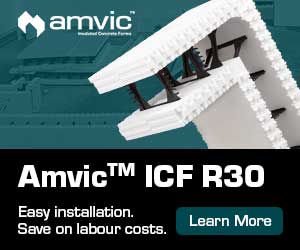ICF Builder Magazine is the information source for contractors, architects, and others involved with the insulating concrete form industry. It’s the only full-color trade magazine devoted to the industry, with project profiles, how-to articles, house plans, and product reviews.
Insulating Concrete Forms are the future of the building industry. Popular for both residential and commercial ICF construction, ICFs create homes and businesses that are energy-efficient, fire-resistant, sound-proof, and durable. Properly constructed, they are tornado and hurricane-proof, and stand up to earthquake, fire, and other natural disasters equally well. Many homes conserve energy so well that heating and cooling costs are reduced by 50-70 percent.
» 2026 «
ICF Builder Award Winners
Current Issue
“If you manufacture or market a product for the insulating concrete forms industry, you simply will not find a more efficient, effective way to reach your audience.”
ICF Comparison Chart
Advertise with us
“If you manufacture or market a product for the insulating concrete forms industry, you simply will not find a more efficient, effective way to reach your audience.”
2025 Builder Award Winners
The winners of the 2025 ICF Builder Awards were announced at the 2025 World of Concrete show. The annual project-of-the-year competition is widely regarded as the biggest event in the ICF industry, and the best opportunity to celebrate the advances that have been made in recent years.
ICF COMPARISON CHART
Every year, ICF Builder publishes an ICF comparison chart in the January/February issue. As in past years, this will also include comparisons of EPS decking systems and non-traditional stay-in-place forming systems.
ICF PRODUCT DIRECTORY
Anyone in the profession of construction who works with ICFs or who wants to know more about ICFs will want to hold on to this annual ICF Product Directory.
ICFs are made from lightweight EPS foam, commonly called Styrofoam. The hollow blocks are stacked like Legos to form the exterior walls of a structure. When complete, the interior of the wall is filled with steel-reinforced concrete to create an incredibly strong and energy efficient home or commercial building.
Insulated concrete forms are growing an estimated 20% a year, and are considered a Green Building material that can contribute significant points to LEED accreditation.



































































































































































































































































































































































